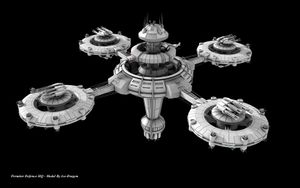
The Class R Space Station is a large scale planetary defense station. With 4 weapons heavy pods around a central hull which together over overlapping fields of fire in a 180 degree arc from each pad.
- Dimensions
- 822 by 304 meters
180 meters diameter weapon pods - Power Source
- Matter/Antimatter Reactor (1)
Heavy Fusion Reactors (6)
Reserve Fusion Reactors (4) - Crew
- 2800 Total
210 Officers
750 Weapons Specialists
1000 Security / Infantry Support
840 Combat Pilots
Defensive Systems
While the station is heavily armored its primary defensive system is the triple shield grid design.
- Ablative Hull Armor
- Primary High Output Deflector Shield Grid
- Secondary Static Deflector Shield Grid
- Tertiary Auxiliary Deflector Shield Grid
Primary Shield Grid
This high output grid is tied directly into the matter/antimatter reactor. It is the highest output shield grid for a station of its size. The primary focus of this grid is to provide projectile deflection capabilities. While it has significant energy absorption capabilities its focus is on deflecting kinetic energy from incoming projectiles. The grid works on similar principles to a starships deflector shield grid while at impulse speeds. This grid can be focused to deflect objects for a specific area or as a general field over the entire station.
Secondary Shield Grid
This static shield grid is tied into the heavy fusion reactors. Rather than the high output kinetic stopping power this grid provides heat and energy dissipation and absorption capabilities. It is only minimally effective at blocking incoming projectiles of any kind but rather focuses on incoming EM and subspace energy. The grid dissipates that energy across the entire static shield bubble as much as possible though is also equipped with high capacity power transfers to divert absorbed energy back into the rest of the grid. This grid can also be configured as a generalized scattering field to help prevent sensor locks from being established.
Auxiliary Shield Grid
This shield system is tied into the reserve fusion reactors. It is the lowest power of the shield grids and is designed to augment the ablative hull armor. This grid is restricted to focus on several meters in close proximity to the hull and focuses on dampening energy, particularly heat and ionizing radiation. This is two fold, the system will reduce incoming power from energy weapons which pierce the secondary grid as well as allow rapid heat dissipation caused by the ablative hull armor sustaining a direct impact allowing the armor to last longer during a firefight. This grid can also be configured to provide an energy dampening field around the station to prevent communications from passing through the hull.
Offensive Systems
- Quad Variable Particle Cannon Turrets (2 per pod / 1 Dorsal & 1 Ventral)
- 190 degree horizontal firing arc
- 95 degree vertical firing arc
- The cannons can operate in compressed pulse or beam modes. They are able to fire in plasma disruptor, nadion particle, and phased polaron particle modes. Each of the cannons on the turrets must be in the same mode.
- Dual Nadion Pulse Cannon Turrets (8 per pod / 4 Dorsal & 4 Ventral)
- 270 degree horizontal firing arc
- 85 degree vertical firing arc
Auxiliary Craft
The station has a large launch complex at the center of the central hull housing 2 full combat fighter wings as well as support craft for the station. The launch complex is divided into 12 bays around a central core spanning 5 decks. There are also another 12 smaller auxiliary bays for maintenance and other support craft directly below the main bays.
Docking Facilities
While the station mostly uses the launch complex for transit as well as transporters, it also has 2 jointed docking rings near the top of the station. They are capable of moving in a 180 degree vertical arc to suit a variety of docking configurations. They are both retractable.